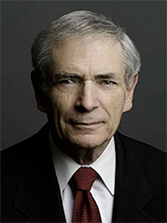Seminars
Prof. J. Tinsley Oden
Oden Institute for Computational Engineering & Sciences
University of Texas at Austin
Goal-Oriented A-Posteriori Estimation of Model Error as an Aid to Parameter Estimation

ABSTRACT: A fundamental and central mission of computational science, indeed of physical science in general, is to predict events that occur in our physical universe, and, in so doing, to acquire knowledge about the behavior of physical systems. Meaningful scientific predictions depend upon the basic pillars of science: observations of events and the accumulation of observational data, often generated by physical experiments, and inductive hypotheses described by mathematical theories that provide mathematical abstractions of the events of interest. All of the components of scientific prediction must cope with formidable uncertainties: uncertainties in data due to experimental noise, the inherent inadequacy of models, uncertainties in model parameters, and, when models are used to construct computational models, uncertainty introduced by discretization. Of these, uncertainties inadequacy of the model and of the model parameters are often regarded as the most elusive, and the most important.
In this presentation, we consider the problem of estimating modeling error in boundary – and initial – value problems characterized by partial-differential equations, with the understanding that the purpose of the prediction, the ultimate goal of the simulation, is to compute specific quantities of interest: the “QoIs”. Mathematically the QoIs are functionals of solutions of the so-called primal or forward problem. We review the theory of goal-oriented a-posteriori estimation of modeling error presented in “Oden and Prudhomme, JCP 182.2 (2002): 496-515”. Here we add to this theory a new ingredient: we explore the question of can such a a-posterior estimates of error between a high-fidelity model of a physical system in which parameters are not known with precision, and a surrogate, low-fidelity models with known parameters, be used to infer properties and parameters of the high-fidelity system? We present a Bayesian framework for studying such issues based on goal oriented QoI-error estimates, and we present examples in which this approach is very successful.
BIOGRAPHY: Dr. J. Tinsley Oden is Professor of Aerospace Engineering and Engineering Mechanics, Professor of Mathematics, and Professor of Computer Science at The University of Texas at Austin. He is the founder and former director of the Oden Institute for Computational Engineering and Sciences, and he holds the Cockrell Family Regents’ Chair in Engineering. Dr. Oden received his Ph.D. in Engineering Mechanics from Oklahoma State University in 1962.
Dr. Oden is a member of the U.S. National Academy of Engineering and is a Fellow of The American Academy of Arts and Sciences. He is an Honorary Member of ASME, a Life Member of ASCE, and a Fellow of seven international scientific/technical societies: USACM, IACM, AAM, ASME, ASCE, SES, and SIAM. He is a founding member of USACM and IACM, and past President of the USACM, AAM, IACM, SES, and TAMEST (The Academy of Medicine, Engineering, and Science of Texas). He serves on numerous organizational, scientific, and advisory committees for international conferences and symposiums. He is an Editor of Computer Methods in Applied Mechanics and Engineering and serves on the editorial boards of 31 scientific journals.
Dr. Oden has worked extensively on the mathematical theory and implementation of numerical methods applied to problems in solid and fluid mechanics and, particularly, nonlinear continuum mechanics. He is the author or editor of 800 scientific works including 57 books, which cover a broad range of topics from continuum mechanics, functional analysis, the mathematics of finite elements, optimization theory, quantum mechanics, statistical mechanics, and several others. He holds seven doctorates including six Doctor Honoris Causa. He has received numerous awards in recognition of his research accomplishments including the SIAM Distinguished Service Award, the SIAM Prize in Computational Science, the Title of Chevalier dans l’ordre des Palmes Academiques from the French government, the Theodore von Karman Medal, the John von Neumann Medal, the Newton-Gauss Congress Medal, the Stephen P. Timoshenko Medal and the O.C. Zienkiewicz Medal. In 2012, the USACM established the J. Tinsley Oden Medal. Dr. Oden was named the 2013 Laureate of The Honda Foundation Prize in Japan and, in 2019, The University of Texas System Board of Regents voted unanimously to recognize his "leadership and generous support” by renaming the Institute he founded as the Oden Institute for Computational Engineering and Sciences. Most recently, he was selected as one of the very prestigious TUM Ambassadors of 2020 by the Technical University of Munich in Germany.
His research focus is on contemporary topics in computational engineering and mathematics, including a posteriori error estimation, model adaptivity, multi-scale modeling, verification and validation of computer simulations, uncertainty quantification, adaptive control, and development of multi-scale models of tumor growth.